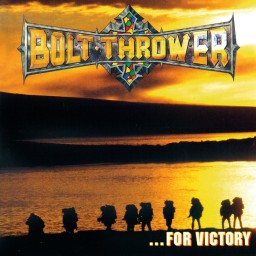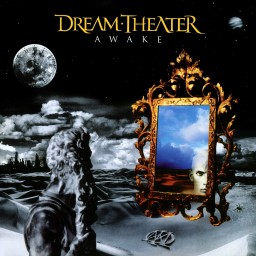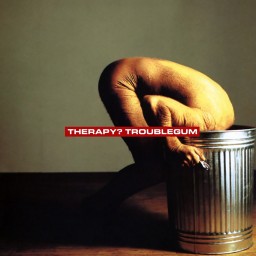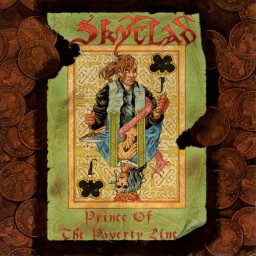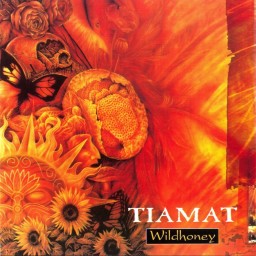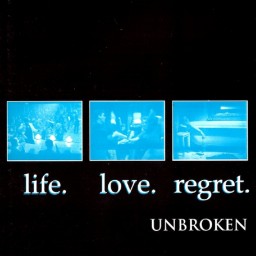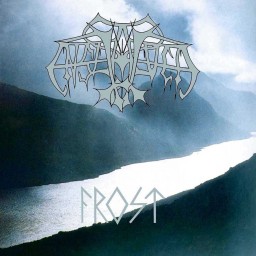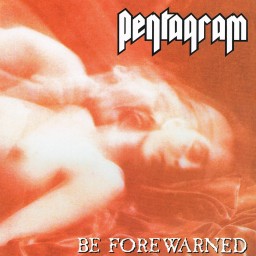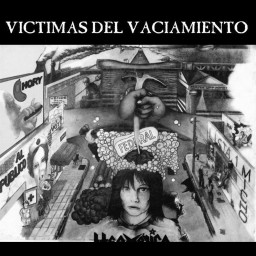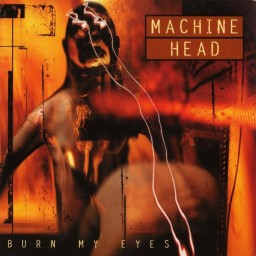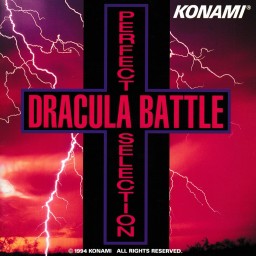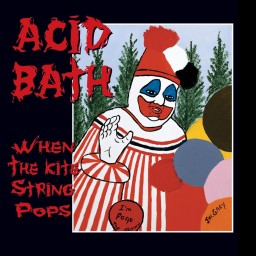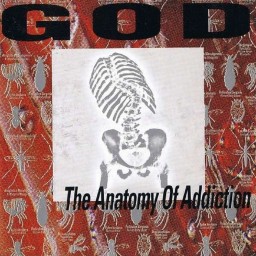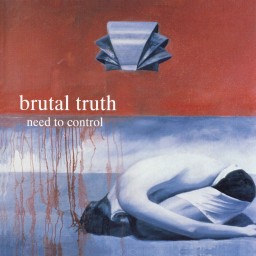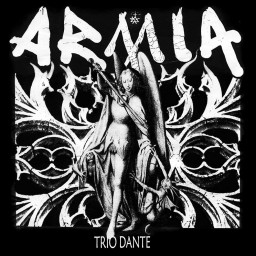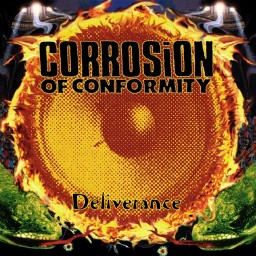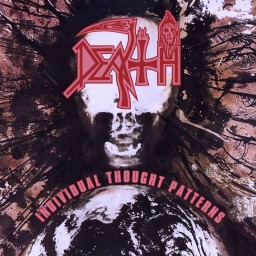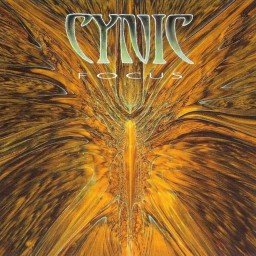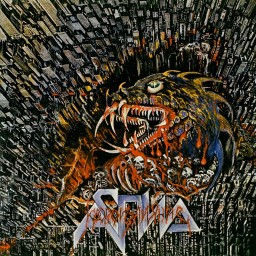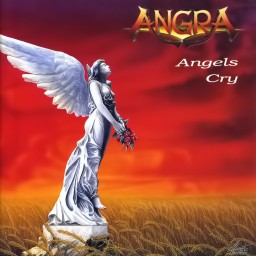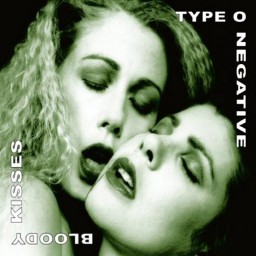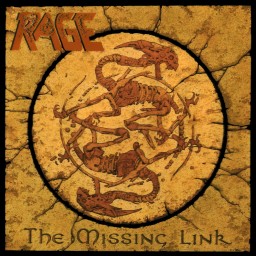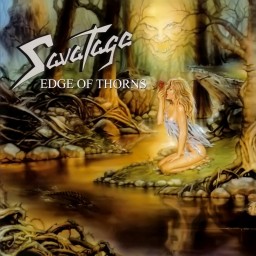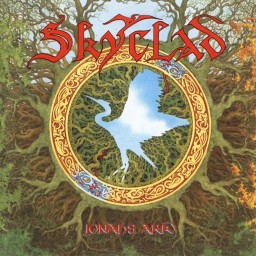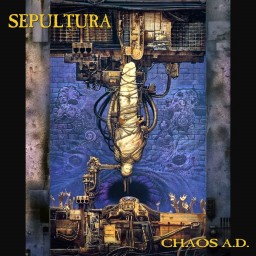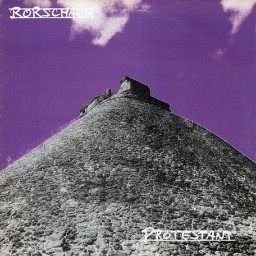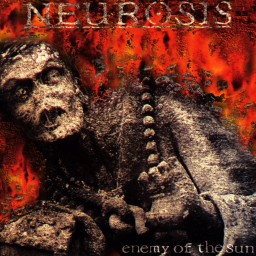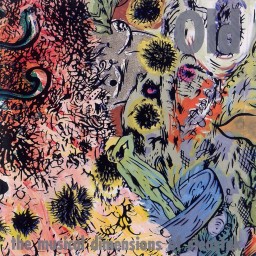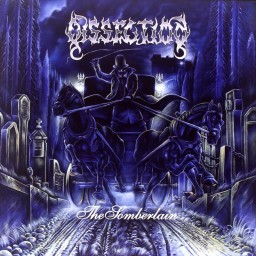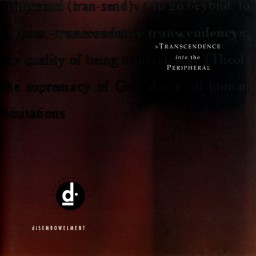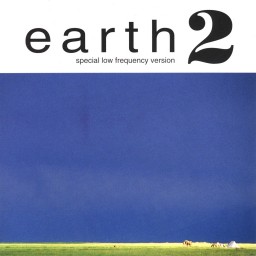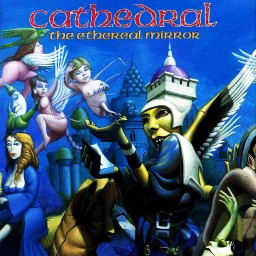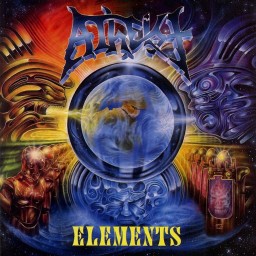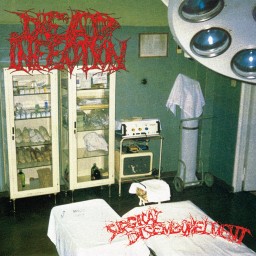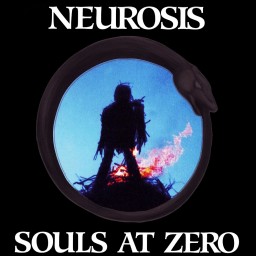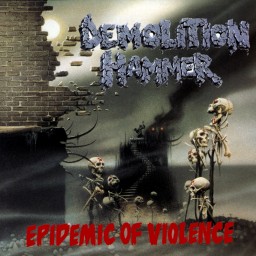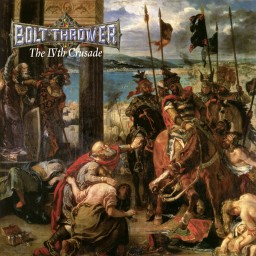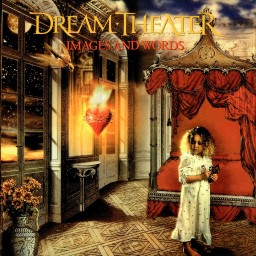SilentScream213's Reviews
Once you get to Bolt Thrower’s 5th album “…For Victory”, there’s not much left to say. Bolt Thrower are one of those bands guilty of writing the same song and putting out the same album over and over. And the song happens to be really good.
The album is scarily consistent, throwing out one riff monster after the next. Each song has a decent variety of speedier aggressive parts and crushing slower/midtempo sections. As always, there’s a very martial atmosphere here, and the dense, rhythmic song structures feel like an enemy invasion. The vocals are fantastic as always, a deep roar that is quite intelligible, like a demonic commander calling out orders. The lyrics here are a bit more realistic than before, and evocative of the more serious catastrophes of war.
If you’ve heard one Bolt Thrower album, you’ve just about heard ‘em all. But when they’re this good, who’s complaining? I’ve got 9 more cuts of Death Metal greatness to add to my forever playlist.
Genres: Death Metal
Format: Album
Year: 1994
A bit lighter and bouncier than the last effort, Dream Theater’s 3rd album saw increased domination by keys. The softer parts are more plentiful and atmospherics are held in quite importance here. There’s still plenty of heavy stuff and it remains primarily a Metal album, but a few songs land strictly in Prog Rock territory, with even hints of Neo-Prog and Acoustic Rock in there.
The album is a little simpler, both in structure and technicality. Even the heavier parts are as smooth as butter, layered with warm keys and backed by a pristine production job. James LaBrie’s vocals have developed further, and quite a few moments here I was truly impressed with his range and delivery. I will say, I generally prefer Images and Words to this, but James’ vocals here blow his last performance away.
Honestly surprised this is held in such high regards since the band took a simpler, more commercial direction here. But thankfully they retained their excellent songwriting ability and taste for infectious melodies. There aren’t any weak songs here and really nothing can even be considered filler thanks to each song having a unique sound and stand out moments.
Also, Space-Dye Vest is… stunning. Impeccable use of samples, brilliant melody, fantastic lyrics… simply amazing.
Genres: Progressive Metal
Format: Album
Year: 1994
Therapy?’s sophomore release is an improvement on all fronts, and a bit of a shift in style. They adopt a punky feel and churn out short, simple and catchy tracks. However, this is still entirely an Alternative Metal release full of identity and various influences.
The biggest improvement here is probably in the hooks category. Every song has some memorable sing-along choruses that manage to mix punk yelling with a sense of melody. The lyrics are simple, angsty and introspective, and I can’t help but feel this was the perfect soundtrack to any troubled teenager’s life in 1994. The songs have great energy and a sense of urgency, and the drumming is way more energetic than the debut.
Across the 14 tracks, some are better than others, but it manages to be quite consistent despite the variety on display. It’s also a bit of a grower, so let those tracks sink in a bit and they’ll be in your head forever.
Genres: Alternative Metal
Format: Album
Year: 1994
Naysayers might have been claiming Metal was dead by 1994, but Running Wild were running strong and delivering cut after cut of rough, nautical Power Metal. Black Hand Inn was just another notch in their belts in consistently quality releases. This one is much faster than the previous Pile of Skulls, reclaiming more of their original Speed Metal influence and keeping with their developed brand of Heavy/Power Metal.
The songs are what you’d expect, a nice middle ground between aggressive German Heavy Metal and melodic Euro Power Metal. Most songs are speedy and soaring, but they’ve got room for slower fist pumpers as well. I prefer when they go full speed ahead, but that’s not to say the slower songs aren’t quality Heavy Metal.
The album is probably their longest yet, ending on a 15-minute epic. The length seems daunting, but every time I put it on, it flies by pretty quickly; a testament to the consistent quality throughout.
Genres: Heavy Metal Power Metal
Format: Album
Year: 1994
Skyclad are once again taking the top spot for Folk Metal on account of being so far ahead of everyone else at the game. Folk elements here are a bit more developed than on prior releases, but it’s still a primitive slab of Heavy Metal compared to what later Folk Metal would become.
The melodies and atmosphere here is quite good, the riffs are primarily sharp but playful, capturing that medieval feel but keeping with some of their Thrash roots in delivering that extra edge. The lyrics here are actually not really folky or even fantasy focused at all, but honed commentary and stories of lower class suffering and modern day societal issues. It’s an odd dichotomy with the music, but it makes the album that much more unique; the lyrics are so compelling I find myself looking deeper into almost every song, rife with literary references and otherwise. The vocalist has a great anger in his gruff delivery that fits the themes. There’s a nice variety of stuff here too, and some more instruments/keys than the usual sole violin found in previous albums.
Genres: Folk Metal Heavy Metal
Format: Album
Year: 1994
An album that leaves me with very mixed feelings. Halfway innovative masterpiece, halfway boring directionless filler. Wildhoney is considered to be Tiamat’s best release, as well as the one where they found their signature Gothic sound. It’s aesthetically unique and many steps ahead of the game, leaving a lasting impression on the Gothic Metal world. But can it back up that legacy?
Calling Wildhoney “Gothic Metal” is only correct because it’s the closest thing to a unifying sound found here. Less than half the runtime is Metal – the rest is a mix of Ambient, Darkwave, Rock, and Psychedelia. And therein lies the verdict. You see, the Metal here is great – particularly the doomier stuff, like Visionare. This track mixes some crushing Death Doom melancholia with the prettier and more ethereal Gothic Metal pretty much invented on this album. A great track, and the other Metal tracks aren’t far behind.
The weakness lies in everything else. Nothing against those other genres of music, but none of the songs are done particularly well. The album doesn’t sound like a super creative mix of many styles; rather, it sounds like a few great Gothic Metal tracks and then a bunch of filler stuff that was easy to put together to fill out the runtime. None of the ambient or darkwave stuff is memorable, and the last track which is an odd combo of Psychedelic Rock, Ethereal Wave and Folk doesn’t have nearly enough going on to justify an over 8-minute runtime. This album was an important piece of art in Metal history, but offers much less than its legacy might imply.
Genres: Gothic Metal
Format: Album
Year: 1994
Metal subgenres were moving off in leaps and bounds in the 90’s despite the decade being what some consider the death of Metal. Metalcore was no exception. The still fresh style only had a few bands to its name, one of which was Unbroken. Unbroken put out a solid debut, but no one seemed to care about it.
Their follow up “Life. Love. Regret.” would also end up being their magnum opus and swansong. The band capitalized on their solid foundation and fine-tuned their style to create a strong album with a great mix of Metallic melodies and pure Punk aggression. The songwriting here is quite good, and it’s an easy listen front to back. Shout out to the lyrics as well, which are great introspections into a depressed mind.
I will say it sounds dated. This might have been a landmark release at the time, but it can only barely keep up with much of what has come out of the genre in the decades following. Unbroken walked so later bands could run.
Genres: Metalcore
Format: Album
Year: 1994
Enslaved managed to release 2 fantastic albums in 1994, and it’s a toss up between which is better. They have surprisingly different sounds to them, but due to Frost’s further foray into Viking Metal, it fills a niche as the best Viking Metal album of 1994.
Frost is an incredibly well-played album especially in the world of Black Metal. Songs are approaching Progressive territory with how many changes they have, and there’s a great variety to the drumming as opposed to some of the other Black Metal of the time. Music is dense and often features acoustic instruments and keys backing the primary Metal ensemble. The acoustic guitars especially do a great job adding some extra melodies and a folky atmosphere.
One real problem here… it’s not really Viking Metal. It’s got the lyrical content and some of that folky feel, but overall, the music here is very much Black Metal. Another problem is the song Yggdrasil, which is an awful slog to get through… the rest of the album is strictly great material.
Genres: Black Metal
Format: Album
Year: 1994
Pentagram’s “Be Forewarned” opens with a scorching track that combines Traditional Doom and Speed Metal (an AWESOME combination by the way) and right from there you aren't quite sure what to expect from this album.
The tracks go every which direction from then on, always keeping the band’s Trad Doom sound, but touching on a variety of influences and styles. An interesting choice on this album was to fill it with a bunch of shorter songs, another unconventional choice for a Doom band. This makes the diversity in material even more impressive, as each of these 13 tracks sound quite different from each other.
Unfortunately, even though the band did a good job of individualizing songs, that doesn’t mean they are all good. Some of the songs, like Vampyre Love, sound rather goofy and uninspired. The first and last tracks are the highlights, and just about everything in between is filler in comparison, making this long, 13 track album feel very hollow. Shout out to Nightmare Gown which is another fantastic, Speed influenced track.
Genres: Doom Metal
Format: Album
Year: 1994
Despite a short career, Hermetica were and remain one of the most revered old school bands in their home country of Argentina. Calling them strictly Thrash would be a misnomer – like the American Metallica, most of their albums feature a variety of Metal and even non-Metal styles, but Thrash is what they’re known for. Their final release, Víctimas del Vaciamiento, is probably the best example of this.
The album has a lot of different styles going on, all of them revolving around Antonio’s guitar and Ricardo’s composition style. While most of the material isn’t mind-blowing in any way, it certainly gets the job done, and offers a great selection of Thrashy riffs and Trad Metal groove. The biggest weakness for me is Claudio’s high pitched vocals, which cannot create a hook or anything other than an obnoxious squeaky yell. Ricardo does vocals on a couple tracks, and his deep, melodic voice is much, much better.
I don’t mean this as a slight against the album, but considering this the best Thrash Metal release of 1994 just goes to show how dead in the water Thrash was at this point. Víctimas del Vaciamiento is a great album, but cannot hold a candle to most of the great Thrash material that came out prior, especially given how not much of this album is true Thrash.
Genres: Heavy Metal
Format: Album
Year: 1994
Burn My Eyes is a great example of Groove Metal done right. The riffs here are awesome, still with a Thrash edge and not too one-note. The rhythm section is full of energy and while there are plenty of midtempo sections, they’re usually filled with interesting drumming, or change up the patterns quickly enough that it doesn’t get too repetitive. Of course, the best parts are when they dial the energy all the way up and those Thrash influences shine through.
There’s a fair bit of other influence touched upon here as well, including Metalcore, Alt Metal, and even some Nu Metal. I don’t think any of that was intentional, but Machine Head managed to create a debut that sounded entirely unique at the time. Probably the best part is that it still holds up today without issue, having a much more timeless modernity to it than a lot of early Groove Metal. If I didn’t know this was 1994, I would never have been able to date this.
Genres: Groove Metal
Format: Album
Year: 1994
I’m a big fan of Japanese Metal band Anthem, so figuring out this was a Castlevania cover album composed and played by members of that band sounded like a great time to me. I’ve never played Castlevania, but I was familiar with at least one track here thanks to Smash Bros. Either way, Metal renditions of Video Game music is something I always enjoy.
And to put it simply, the album delivers. Everything you expect from Anthem is here – energetic Heavy Metal with melodic riffing and over the top solos. Likewise, it still has that video game feel, with very prominent and catchy keys emulating that early video game sound. Most of the album is energetic and pummeling, but there are slower, more atmospheric songs in the mix as well.
The biggest thing that gets me here is just how timeless it sounds. Especially with the uniquely Japanese style of keys, this sounds like what a lot of later Power/Symphonic Metal bands would go for. Yet, it retains that strictly classic flavor of both Metal and bit music. The production is great too, and truly sounds like it could have come out today. I’ve yet to hear the previous albums by Kukeiha Club, but I have not heard any albums recorded earlier than this that have this type of sound, making this an unsung progenitor of… well, whatever you’d call this video-gamey metal stuff.
Genres: Heavy Metal Neoclassical Metal
Format: Album
Year: 1994
One of the most eclectic Metal albums of its time, and certainly not something I expected from the Sludge Metal genre. About half the songs are true Sludge Metal, and even those are rife with other influences, namely Stoner and Avant-Garde Metal. Then there’s a bunch of straight Stoner Metal, some Acoustic Rock, Folky stuff… At times it really sounds like if First Utterance was a Metal album.
The music itself is pretty straightforward, it’s just combined in ways that make it less conventional. The lyrics on the other hand, are absolutely nonsensical and bizarre. The overall package is most certainly a decent representation of a mentally ill psycho going through drug addled hallucinations.
At over an hour long, the variety definitely helps differentiate the songs and retain interest. The album does a good job of switching between speedier, aggressive material and slower or gentler songs, keeping the pacing even. Unfortunately, while surprisingly consistent for the variety and length, it doesn’t have many great songs. Most of them are good with a few standouts like “Cassie Eats Cockroaches” and “Scream of the Butterfly,” but there’s nothing here I care to return to in the future.
Genres: Sludge Metal
Format: Album
Year: 1994
Time for a hot take, given how beloved this album is…
Kyuss has never done much for me, and while this is my favorite of their material I’ve heard so far, it’s still stuck in “decent” territory. I actually liked this album more the first time I heard it; the riff of the first track was pretty catchy, and the way Asteroid jams is quite entertaining indeed. I was prepared to like this album a lot.
However, the more I listened to it, the more it grew off me. The riffs, for the most part, are quite repetitive, sometimes becoming dull, and after multiple listens the magic they had has gone stale. A fair amount of the tracks have jam sections in them, and the band doesn’t go anywhere most of the time. The solos sound like they’re trying to be psychedelic, and don’t create much in terms of melody or technique. People praise the vocals, but they’re just very generic Stoner Rock/Grunge vocals, and on top of that the lyrics are quite poor.
The album is not without strengths, and I will recognize them. Asteroid is a very good song, for one. The riffs are quite monolithic, there’s a good amount of energy and variation to it. The album is overall very consistent, and easy to listen to front to back. Another thing people say is that the album does a good job of actually taking you to Sky Valley, and I totally agree. This album just oozes desert heat, dehydrated mirages and psychedelic pink skies. I did also have the pleasure of listening to this on a hot sunny day in the car with the windows down. That’s how it’s meant to be, I think.
My own biases aside, the album is a good ride start to finish, but does little to stand out amongst its genre. Lick Doo is particularly embarrassing and just a final slap in the face as the album closes. While this album has a time and a place, it’s not strong enough that I’d want to spin it again anytime soon.
Genres: Non-Metal
Format: Album
Year: 1994
The Anatomy of Addiction is a highly dense record with a lot going on, but not much to grab onto. It has a variety of styles and influences present across the nearly 80 minute runtime, and in no way is this a regular Industrial Metal album. In fact, I have reservations about calling this Metal at all; sure it’s got some harsh vocals, drums and a guitar, but this is heavy in much the same way as Swans’ early material was. It’s not metallic.
There are pretty much two things that go on here that I can’t stand;
- One or more instruments will repeat one simple beat, melody, or sound over and over, sometimes for minutes, and it’s never anything good enough worth repeating that long
- One or more instruments will break out into free improvisation, doing stuff with no sense of rhythm or key or anything pleasant at all. Just to sound as chaotic as possible.
I will say that for what it is, it’s not poorly done. I do think they achieved what they wanted here. I just happen to strongly dislike it.
Genres: Industrial Metal
Format: Album
Year: 1994
After the fantastic debut, Brutal Truth return with a follow up that is much less one dimensional, but also less consistent. In opposition to the near constant pure Deathgrind pummeling on the debut, Need to Control features some slower songs, some straight Grindcore, and a decent amount of Noise influence on a few tracks, with some being pure Industrial/Noise.
The opening track is a pretty big surprise from the band, being akin to a Death Doom sound and really slowing down their formula, but it pulls this off rather well. The album continues to flow between their signature Deathgrind and the other influences I mentioned above. One huge issue with this album is that most of the experimentation is not as great as the Deathgrind, and the Deathgrind on this one just doesn’t match up to their debut.
Ultimately, there’s nothing on this I’d rather hear than the debut. The inclusion of other sounds and experimentation might pay off as growth later, but here it’s not fully realized, leaving the album inconsistent.
Genres: Death Metal Grindcore
Format: Album
Year: 1994
Armia is an odd band that have been all over the musical spectrum by the time they dropped their fourth album Triodante. Seeing the album tagged with Avant-Garde Metal, I really didn’t know what to expect this time.
Opening track Wyludniacz is a great metallic banger that brings back the French horn that helped them stand out. The track has double bass drumming, which I believe was a first for the band, and also slower groovier sections, leaning towards Progressive Metal in parts. Not very Avant-Garde, but I wasn’t complaining. The second track was even better; heavier, faster and straightforward.
After that, the album is hit or miss. I will admit this is more due to my taste rather than the actual quality of the album; about half the songs from here are slower, more Avant-Garde pieces that are experimental and progressive. I much prefer their speedy aggressive stuff, but most of these tracks are still skillfully composed. They just spend a bit too much time in slow, boring territory, and the tracks are quite overlong; shaving off some of those experimental bits would have helped this one for me.
The good thing about these long, everchanging tracks is that most of them still have really awesome parts, with great riffs and French horn. I really miss the darker atmosphere of the sophomore album, and this one is a bit more bouncy and tribal. The two tracks that are almost entirely tribal beats definitely bring this album down a lot for me. Regardless, it is full of tracks that can stand against their better material.
Genres: Avant-Garde Metal
Format: Album
Year: 1994
On Deliverance, Corrosion of Conformity finally settle into the style now known as Southern Metal and deliver one of the first and finest cuts of the genre. After dancing with Crossover Thrash and Groove Metal in the past, their fourth effort sees them abandon nearly all of their aggression for a more laid-back rocker filled with anthemic vocals and simple but effective riffs.
Stoner Metal is usually one of my least favorite subgenres of Metal, but Corrosion of Conformity play it very well here, and have an eclectic mix of styles going on over the album. Some songs are fast, some groove slowly, and some are entirely outside the Metal umbrella. It’s a fun album most of the time. For an album with 14 tracks and a good variety in sound, it stays shockingly consistent.
At the end of the day, it’s still a style I’m not a huge fan of. I like it, but I don’t love it, and most of the album falls around the decent-to-good category for me. Case in point, my favorite track is Without Wings, a beautiful acoustic piece with string accompaniment that sounds nothing like the rest of the album.
Genres: Stoner Metal
Format: Album
Year: 1994
It’s truly astounding how consistent Death are at crafting top quality Death Metal, not only album to album, but song to song. Every Death release so far has been a fantastic showcase of new ideas and progression on top of all the classic traits that make it unmistakably Death. Individual Thought Patterns did not fail to exceed my expectations despite the legendary precursor Human.
This album has got to by Death’s most melodic, technical and progressive so far. The riffs are incredibly melodic and memorable, with multiple guitar melodies often playing wonderfully off each other. This of course does not take away from the brutality of the album; it borders on melodeath at times, but at the core is still classic OSDM. The album doesn’t sound incredibly evil compared to other Death Metal, but this is fitting with Chuck’s desire to focus on more philosophical subjects. As the album title suggests, this record is total brainfood, fortunately the kind where the riffs get stuck in your head.
What really blew me away on this one was the rhythm section. The drumming here in on another level, and so many patterns here were totally fresh. As I suspected, this is where Gene Hoglan made his debut in Death. His creativity with the kit is monstrous, and goes far beyond progressive or technical. He manages to craft entirely original beats in every song, and knows exactly when to go all out and when to serve the music with something slower or simpler. The basswork of Steve DiGiorgio is similarly praiseworthy, and thank god the production made it clear and audible. I was fairly certain it was fretless bass based upon the sound, and it seems he is possibly the first to bring fretless bass to extreme metal.
5 albums in, and Death is still at the forefront of the genre they helped create, leading it in new directions and maintaining their status as the best of the best.
Genres: Death Metal
Format: Album
Year: 1993
A wild ride of an album rife with technical prowess and atmospheric beauty. Easily the first of it’s kind, in 1993 there were no (to my knowledge) Death Metal albums purposefully trying to sound “pretty” or peaceful” juxtaposed with all the other elements of extreme music. Death Metal bands were all trying to predict or be the next development in the genre; usually this was defined by Death (the band) and their constant evolution and progression of the genre, but a few bands like Cynic still managed to stand out and make it to still undiscovered frontiers.
When talking about Cynic, one has to address the elephant in the room – those vocoded vocals. Because they’re definitely there, on just about every track. When I first heard those open track 1, I thought for sure they were just being used to intro the album. Then they consistently appeared throughout the song, and I’d hoped they were a one song gimmick… no luck. They are prevalent throughout the whole album. Eventually I was able to tolerate them, and I do appreciate the futuristic aesthetic they bring to the album. I understand the purpose, and it was certainly a bold move to put in a Death Metal album. That aside, I will probably never enjoy them, and they definitely keep this otherwise flawless record from a higher rating.
But what a masterpiece this is otherwise. The Tech Death aspects of this record are very melodic and riff-driven, with noodling never overtaking the primary goal of creating fantastic and memorable melodies. Like all the best albums, every instrument is playing lead; rhythm instruments are varied and powerful, bass is very audible and melodic itself. Then there are the keys and various other atmospherics and electronics, which add wonderfully to this album. They are worked tastefully between catchy leads and adding lush backing sound. Overall the album sounds incredibly futuristic and spacey, an incredible feat for 1993. It still sounds very fresh decades later.
One very great aspect of this album is there is never a dull moment. In fact, it’s so insanely layered you could listen to it over and over and always find something new. Even the slower, more peaceful parts have so much going on, it really is an “experience” without being overly pretentious. Just fantastic music here.
Genres: Death Metal Progressive Metal
Format: Album
Year: 1993
From the Russian tundra comes a Tech Thrash draconic beast that was unfortunately a few years late to the game, but no less legendary in its own right. Since it came from such a remote place and after Thrash was dead and buried, Кровоизлияние had no chance of success. The band never broke through nor released any other material. However, to think that says anything about the quality of this album would be a massive mistake.
Aspid’s debut and sole album is a Progressive/Technical Thrash package of pure quality and talent. The musical ability and songwriting is fantastic, even the simple production is very good at ensuring every aspect of it is clear and audible. I am of course referencing the bass, which is amazing and very noticeable here. There’s nothing to this other than the barebones guitar drums bass vocals setup, but every instrument is working insanely hard.
I think the best thing about this is that it’s not overbearing like some Tech Prog can be; the songwriting is extremely efficient at mixing technical prowess and wow factor with a consistent musical progression that feels natural and enjoyable. In short, they sound like damn good songs as opposed to feats of ability. The technical, big brain aspect of the music just ensures you can come back again and again and never get bored.
Genres: Thrash Metal
Format: Album
Year: 1993
Angra were not quite the inventors of Symphonic Metal – that accolade would have to go to X Japan – but they were absolutely at the forefront of its development. What’s more, the style of Symphonic Power Metal first crafted on “Angels Cry” is a style that has carried on to the present day. The genres tend to go hand in hand now, rarely one existing without some element of the other, no doubt the legacy of this majestic work.
Something that is immediately apparent is that this album is incredibly rich and developed for a debut album. The symphonic elements are in full swing, there’s a strong variety of sounds all pulled off quite well, and the music is quite frankly impressive. This band knew exactly what they wanted to do from the get-go, and they hit the ground running. Another interesting factor is that this is a debut album from Brazil of all places, yet the production is very good, as if it were a popular band with a big budget. Of course, the guest appearance of Kai Hansen of Halloween and Gamma Ray fame is testament that this band was not totally unknown and must have had some notoriety.
One slight weakness for me is that the vocals can be quite pitchy at times, and always stay at the very high end of the registry. Despite that, the guy definitely has impressive range and technique, just doesn’t always suit my taste. The two part closer is also not anything amazing, meaning the album is bookended by its weakest tracks if you include the intro.
Overall, amazingly impressive and cohesive debut album, hasn’t aged a day.
Genres: Power Metal Symphonic Metal
Format: Album
Year: 1993
I’ll have to admit right off the bat, as someone who loves Gothic Metal, Type O Negative are pretty much antithesis to what I like to see in the genre. Full of humor and groove, the album is about as far removed from Doom as Gothic can get, and spits in the face of any melancholy normally associated with Gothic Metal. Most of the time, the band is just having fun, and as a result there is a lack of any genuine emotion to it.
There are at least plenty of moments of decent musical composition. The Title track stands out as quite a good song, their closest to Doom here, and a few other tracks make great use of keys and other sound effects to layer the music. Unfortunately, Peter is always throwing ridiculously stupid lyrics over the music, which ruins a good amount of it for me. His delivery in general is hammy in a bad way, like he’s always trying to parody something.
Impressive musically, disappointing altogether.
Genres: Gothic Metal
Format: Album
Year: 1993
Rage are one of the longest running and most consistent German Metal bands out there. 1993 was only 10 years into their career, but The Missing Link was already Rage’s 7th(!) album, and they continued this trend of releasing an album at least every other year for many decades. Amazingly almost all of them are great, but 1993’s “The Missing Link” may be where they settled on a trademark sound of simple but effective Power Metal with generous Heavy, Speed, and Thrash influences.
If you know Rage’s sound, there’s not much to say about this, but it’s quite simply aggressive Power Metal that sacrifices some of genre’s usual melodicism and catchiness for classic Metal riffage. Lost in the Ice flirts with Symphonic elements, which would become more prominent on later albums. This album is incredibly consistent across its 12 tracks, and the thing about Rage is while they write very few poor songs, they similarly write just as few masterpieces. Instead, they crank out a vast number of great tracks with solid songwriting and riffs. The Missing Link is right around their peak era, so you can expect every song here to be very good; just don’t expect any mind-blowing numbers.
The bonus track cover of “Beyond the Pale” is absolutely amazing, one of those few masterpieces and it didn’t even make the album!
Genres: Heavy Metal Power Metal
Format: Album
Year: 1993
Savatage is one of those bands that has quite a few albums in competition for their magnum opus, and depending on some, Edge of Thorns is that album. The most prominent difference here is that Zachary Stevens replaces Jon Oliva on vocals, though Oliva was still heavily involved in writing. Zachary has a more refined vocal style; it’s smoother and more operatic, and dare I say accessible. This reviewer prefers Jon’s poignant delivery and passion, but Zachary is certainly no detriment to the band.
Otherwise, the album is a pretty balanced package, a culmination of the styles they’ve developed on the past 3 albums. It’s lush with piano, and features a strong variety of riff driven rockers, beautiful ballads and effective instrumentals. Unfortunately the first 2 tracks are the strongest, which is a pet peeve of mine. Monstrous openers showcase precisely Savatage utilizing their melodic ballad-meets-metal style (Edge of Thorns) and classic riff writing prowess (He Carves His Stone), but it never meets those heights again. Thankfully, there aren’t any bad tracks, and the album is class quality front to back.
Genres: Heavy Metal
Format: Album
Year: 1993
On Jonah’s Ark, Skyclad finally relieve themselves of all Thrash roots and focus entirely on the Folk Metal sound. Here, the violin is featured prominently on just about every song, and the riffs have a rhythmic, medieval feel to them. The music is quite upbeat, melodic and “fun” in a way. Interestingly, instead of focusing on fantasy or medieval tales, the lyrics tend towards conscious social commentary, often disguised in fantastical allegory.
Most of the riffs here are pretty tasty, and the Folk elements really set the band apart from anyone else of their time. It hasn’t held up exceptionally well however, since folk bands afterwards usually do a lot more with the folk aspect of their music. The energy and speed of this one is quite subdued, which is something I sorely miss from the debut.
Overall a great album, but it tend to makes me want to listen to their thrashing debut instead.
Genres: Folk Metal Heavy Metal
Format: Album
Year: 1993
Even before the exit of one, then both, of the Cavalera brothers, Sepultura’s fanbase was divided by the band’s new stylistic directions, most initially on Chaso A.D. The album saw the band influenced by the changing landscape in Metal (in part they were influencing it themselves) and they all but dropped their Thrash roots, slowing to a rhythmic groove. Even here, they incorporated some tribal beats no doubt stemming from their heritage. Lyrically as well, the album gets more abstract and even alternative in parts.
I’m in firm favor of no holds barred Thrash era Sepultura, and this album is where their string of mediocre material begins for me. The riffs are quite simple and repetitive, and ditto to most of the drumming; It’s very tom-heavy, with loads of good fills, but the actual beats are weak. Naturally I favor the speedier tracks: opener Refuse/Resist, Propaganda, and Manifest have remnants of their Thrash style. The rest is certainly not bad either, and most tracks have enough aggression to give them power despite the drop in speed and energy. It’s a fine Groove Metal album, but I’ll always be over the fence on the Thrash side of Sepultura.
Also, that cover of The Hunt is brilliant.
Genres: Groove Metal
Format: Album
Year: 1993
Protestant was an interesting direction for Rorschach to take, adding a ton of new influences to their established Metalcore sound. There are moments of mathy technicality, slower sludgy plodding, and plenty of varied Metalcore riffing in between. For its time, it was a totally unique beast, and no doubt incredibly influential in multiple different directions among the “core” genres.
I find it slightly weaker than the debut, as there is a lot more disjointed chaos and the lyrical content is far more abstract. The honest and emotional delivery of their first release appeals to me more; however, this album is no slouch by any means. Musically it is quite advanced and diverse, and the switching up of tempos and styles keeps it interesting and entertaining. Very ahead of its time and easily still holds up well.
Genres: Metalcore
Format: Album
Year: 1993
After the success of wildly innovative “Souls at Zero,” Neurosis seemed eager to one-up themselves in regard to making something that sounded different. The result was an album that focused more on being avant-garde and unique than it did on sounding good. Enemy of the Sun did indeed capture an entirely new sound, but it sacrificed a lot of what made their previous album so good.
The album is very heavy with samples, and has an overall tribal feel to it. The percussion is often focusing on tom-heavy fill beats, and the guitars usually create atmospheric walls rather than riffs. If I’m being honest, there’s not much of the album that sticks with me due to the fact that there are no memorable melodies of any sort. The atmosphere isn’t anything impressive either, for how much they focus on it; “Souls at Zero” did a great job of conveying a desperate struggle and cold, hopeless pain. Enemy of the Sun seems more eager to convey, I don’t know, existential ramblings of struggles in third world countries or something. It’s more bizarre than it is evocative.
That’s not to say the album is bad, as moments of grandeur are hiding among the vast boring parts. The first two tracks have some great atmosphere to them, and the guitars and keys use single notes to create excellent pangs of moodiness. Penultimate track “The Time of the Beasts” simply sounds much more akin to material on “Souls at Zero” and is therefore easily the best track, lush with various instrumentation from strings to horns to samples.
The album merely pales in comparison to what came before. Unless, of course, you enjoy tribal Avant-Garde Metal, in which case, you may like this quite a bit. For me, the departure from doomy monoliths is a hard decline.
Genres: Sludge Metal Post-Metal
Format: Album
Year: 1993
Not only one of the weirdest Metal albums, but plainly one of the weirdest albums period. Old are one of the fastest changing bands out there, exploring bizarre new frontiers on each release that are vastly different from the prior.
The Musical Dimensions of Sleastak is a nonsensical, Industrial affair between Metal and electronics. The songs are split between extreme metallic rocking and spacey electronic noise, all the while being very experimental in nature. A decent portion of this release is not Rock music at all, rife with science fiction-esque atmospheric noise that is difficult to define.
Wildly inconsistent in the end. Definitely a step down from Lo Flux Tube, although arguably more experimental and genre-busting. Fans of weirdo music will love this, and even those who aren’t may find this one intriguing listen.
Genres: Avant-Garde Metal Industrial Metal
Format: Album
Year: 1993
Yes, this brand of sombre Melodic Black Metal is absolutely to my taste. It also helps that this has huge Melodeath influences, enough so that you could easily give this album the accolade of being at the forefront of both genres. Mixing two genres still in infancy and managing to ace that combination is quite an incredible feat!
That’s what makes The Somberlain unique, but certainly not what makes it good. Every song is packed with excellent riffs that dance the line between evil, sombre, and folky. The drums have an incredible amount of diversity for a Black Metal album (the Melodeath influence is very strong here rhythmically) and you can expect much more than constant blast beats. The rhythm section is always changing, usually quite energetic but slowing down surprisingly often to allow riffs and atmosphere to marinate in a calmer zone.
The vocals sit right between Death growls and Black Metal shrieks, having a nice weight to them but maintaining a raspy enunciation that works very well. Most of the lyrics/themes are standard BM fare, focusing on occult darkness, but they’re well written. I will say, the acoustic interludes really don’t add anything to the album, and would have been more effective if interwoven into the songs. Unfortunately, they hurt the momentum because they aren’t strong enough to stand on their own. Otherwise, a great dark triumph that still stands above a vast majority of the hundreds of attempts at this sound since.
Genres: Black Metal
Format: Album
Year: 1993
A very difficult album for me to rate, as Death Doom is perhaps my absolute favorite genre, and Disembowelment’s first and only album is considered by the some the greatest Death Doom album of all time. It was certainly the first album to have hints of Funeral Doom and would end up becoming influential in that scene, and has a ton of straight Death Metal compared to most Death Doom.
The cooler parts of this album are definitely the way it uses clean, reverbed guitar notes to create melodic atmosphere, but this is only done occasionally. The variety in drumming is also very nice, with everything from Funeral Doom plodding to full Death Metal blastbeats. So, wherein lies the problem for me?
Death Doom was still very primitive in the early 90’s, and Transcendence into the Peripheral is no different. It is extremely basic both in style and execution. The riffs, if you can call them that, are very monotone and minimalistic. That’s not uncommon for Doom, but the way minimalistic riffing works is by creating and relying on strong atmosphere to carry the song. Disembowelment completely falls flat in this regard.
Outside of a few moments with cool backing vocals and reverby clean instruments, there is really no mood created at all, and therein the atmosphere is empty and boring. The songs have no emotion, even the lyrics are spiritual and abstract ramblings that carry no weight. They talk about death and darkness sometimes, but it’s in a Death Metal ad lib sense, none of the beautiful, moving poetry that is so prevalent in the Doom genre. The vocals are another totally monotone aspect of the release, really providing nothing but some extra bass as they’re totally indecipherable without a lyric sheet, with very little variety or expression.
Disembowelment is oppressive, if anything. The music is heavy as hell, challenging, and I will say, unique for its time. In addition, it was influential. But to call this the greatest Death Doom album to me is incredibly sad, because the genre grew and expanded so much throughout the years. Where this album is lethargic and devoid of emotion, Death Doom later churned out much of the most passionate and moving music I have ever heard. Where this has little melody or atmosphere, later bands made those qualities a staple in extreme Doom music and use them to great success. Disembowelment represents the genre before it found it’ identity, and evidently, before it became something I love.
Genres: Doom Metal
Format: Album
Year: 1993
Maybe the first /true/ Drone Metal album, although there’s really nothing metal about it unless metal just means “distorted guitars.” The last track has some bass and drums backing it to sound more metallic and lifelike, the rest is just very simple and slow guitar “riffs” with a ton of distortion.
Earth’s first demos actually had a slightly doomy feel to them, with a full instrument ensemble and even vocals at times. This is, for all intents and purposes, just Ambient Drone. It’s fuzz and noise that is inoffensive and stagnant for over an hour. I can see how it could be relaxing, at the best of times. Problem is, even if I want to relax with some Ambient music, I still want the music to do something. This is essentially background noise, if you lived in an amp warehouse, or a Guitar Center underwater.
Maybe there is some genius in the exact frequencies or textures here, maybe there was some grand blueprint for these no less than 15-minute tracks, or maybe there’s absolutely nothing special to it at all. Either way, it’s not for me.
Genres: Drone Metal
Format: Album
Year: 1993
Cathedral’s sophomore album is a slight transition from their purely Doomy debut. Never thought I would say this, but the Stoner tinge added here definitely improves the album. The riffs and energy here is awesome, and some tracks, namely the first half, are just great fun. Even so, they retain that Doomy delivery and aesthetic, with interesting lyricism that dances between abstract psychedelic madness and gloomy pessimism. The songs are much more energetic and eclectic, with the rhythm section especially picking up in interest factor.
On the other end of the spectrum, some of the tracks here are much more gloomy, passionate and serious than anything on the debut. A great example of this is “Jaded Eternity” which is pure Paradise Lost in style, monumental riffs and passionate chorus taking it as far as the band can go. The second half of the album in general sticks pretty close to true Doom, though retaining some of the newfound energy the band picked up.
This juxtaposition of energetic grooving and dark gloom work wonderfully on the album, at times kept separate and others intertwined. The vocals can be an acquired taste, but they definitely appeal to me, especially in the places where his roar is tinged with sorrow, a gruff bellow still wonderfully able to hold notes and melodies. Awesome album that offers a great mix of moods and styles.
Genres: Doom Metal Stoner Metal
Format: Album
Year: 1993
Elements is, without a doubt, an incredibly fascinating album. Atheist retain their insanely technical and progressive style of playing, but traverse even further into progressive music, reaching the avant-garde. The music itself isn’t too bizarre, but the amount of styles crammed into any given song quite frankly is. There’s a lot of jerking around here, start-stop techniques and rapid changes not only in tempo, but also style and mood. The instrumental prowess of every member is nothing short of mind-blowing; the songwriting is hard to judge because it seems to purposely subvert expectations and go to odd places, but this doesn’t always work to its benefit.
Another interesting factor is the concept undertaken, focusing on the 4 traditional elements throughout the album. The album seems to loosely document the introduction and evolution of life on Earth via introducing the elements. This adds another layer of entertainment and intrigue for anyone willing to read along, and makes the songs more than just platforms for showcasing instrumental ability.
Unfortunately, the end result is far weaker than the previous two albums for me. First off, there is an abundance of interludes that offer nothing to the album, neither musically nor thematically. Along those lines, there are many passages in certain songs that are similarly shoved in there seemingly just to surprise the listener or do something “different,” but this usually takes away from the songs rather than add anything. Lastly, the music seems, on the whole, unrelated to the themes. When writing a song for each of the 4 elements, you’d think you would at least try to evoke the elements musically, but overtly this is not the case.
The title track is iconically a perfect combination of everything done right on this record, and one of the best songs of the band’s career. A fitting final track for their (at one time) final album.
Genres: Death Metal Progressive Metal
Format: Album
Year: 1993
Dead Infection play a rather “slow” strain of Goregrind, having plenty of Death Metal groove and a rhythm section doing much more than constant blast beats. The slower parts of the songs create a great dynamic between the more typical Goregrind blasting, and makes this album much less one dimensional than most Grind of the time. The riffs aren’t crazy, but again are stronger than typical Grind genres, where noise tends to overtake real riffing.
Make no doubt about it, the material on Surgical Disembowelment is great, but it’s not without flaws. The production, in my opinion, manages to be worse than their EP from the previous year, quite muddy and muffled. It’s far from unlistenable, but it definitely detracts from the music for this reviewer. The vocals are quite poor as well, unintelligible and guttural, they act as another bass element to the music. The lyrics are also generic Goregrind fare, random imagery of gross anatomical destruction.
Strong considering where Grindcore was as a genre in 1993, but Dead Infection themselves did better on their prior EP in my opinion.
Genres: Grindcore
Format: Album
Year: 1993
This was one of the biggest surprises in my course of listening to Metal evolve chronologically, for a few reasons. First of all, I hadn’t been a fan of Sludge Metal or Neurosis so far, so my expectations were something very different. Second of all wow, it’s breathtaking, especially considering absolutely nothing sounded like this in 1992, not even close. The layering, atmosphere, and building crescendos here are what would become the genre of Post-Metal, as well as Atmospheric Sludge.
Despite that terminology, this album has much more in common with Doom than any prior Sludge, and that’s why I love it! It’s all pessimistic melancholy and gloomy angst here, built on anxious, depressive but often melodic and sometimes beautiful melodies. The slow, plodding tempo is accented nicely by interesting rhythm work. The vocals are the only trait really reminiscent of Sludge, being a hardcore punk-esque strained yell that works wonders against the grim soundscapes. The desperation and angst in the vocals is ferociously convincing.
The core band creates some amazing instrumental soundscapes, the guitars especially doing some very interesting things I couldn’t begin to describe to add to the wall of punishment. It sounds dissonant, but never chaotic; very well constructed and orchestrated to add unique layers to the sound. However, possibly the most interesting factor to this album are the samples and other instruments/keys used quite liberally. The samples effectively convey some hopeless situation or another, and add to that overall anxiety purveying every moment. The other editions are endless… piano, violin, big band hits, horns, and more. Some are obviously synthed, so it might all be the work of keys, but it adds so much to the already very strong arrangements.
Something I noticed were a lot of moments that reminded me of one of my favorite bands, Mar de Grises (before now I hadn’t heard anything that really did). I think that shows the clear Doom sound here as well as the Post-Metal influence on the later band. Anyway, this thing is very nearly a masterpiece, huge variety and immense quality. A few fillers hold it down, but the heights are vast.
Genres: Sludge Metal Post-Metal
Format: Album
Year: 1992
One of the best Thrash bands who continuously saw production issues finally gets a release that does them justice. Epidemic of Violence has all the unbridled aggression, insane riffage and manic rhythm that has been prominent since their Necrology demo, but at last we get crisp audio that allows their full potential to blast through.
Demolition Hammer are all the way on the “almost Death Metal” spectrum of Thrash, not only in terms of heaviness, but stylistically as well. Near Tech-Thrash levels of precision and abrupt changes are abound, and the rhythm is a constant pummel of hyper-energized force. Lyrically, the songs focus on violence and death, but are well-written with a very impressive vocabulary, and impeccable delivery.
The artist and album names tell you exactly what to expect here, and god damn do they deliver. Classic Death tinged Thrash, played with vigorous precision and executed flawlessly. You as the listener are their victim as they beat you senseless track after track, the only reprieve being a short instrumental “Orgy of Destruction” before they’re back to smashing your bones and skinning you alive. Also gonna shout out that album closer, “Aborticide”… phenomenal showcase of dark aggression.
Genres: Thrash Metal
Format: Album
Year: 1992
Bolt Thrower has been putting out Death Metal since the very early days of the genre, and though the debut was a bit rough, all of their releases have had a very consistent level of quality without doing anything too dangerous. Insanely heavy, crunchy guitars and classic OSDM riffage is the name of their game and they win every time.
The IVth Crusade is to Bolt Thrower as South of Heaven was to Slayer. The band slows down a bit, even including a few tracks that could qualify as Death Doom (except it just sounds like slow Death Metal), and focus a bit more on melody. That’s not to say this album isn’t packed with energy though, as many of the tracks are still loaded with double bass drumming and tremolo riffs.
There’s very martial feel to this album. Bolt Thrower has always written about war and battle, but the mid-tempo pace and march-like rhythm section really seals the atmosphere here. Again, this album isn’t doing anything new, it’s just executing OSDM incredibly well, and makes for an awesome listen front to back. Couldn’t ask for more from this legendary band.
Genres: Death Metal
Format: Album
Year: 1992
Images and Words is kind of the first Progressive Metal album of the white collar, semi-symphonic ballad heavy variant. While Dream Theater’s debut was a pretty generic slice of first wave Prog Metal, here Dream Theater take a cue from the likes of Queensryche and Fates Warning, adding strong, anthemic choruses and near-Pop commercial sensibilities, though retaining the later band’s complex songwriting and musicianship. More interestingly, they borrow Savatage’s melodramatic balladry, and bring a strong ensemble of keys, strings, sax, and probably a bunch of other instruments to the mix.
New (and now long-time) Vocalist James LaBrie adds a signature charisma to the vocal delivery, with an impressive range and strong lyrical chops. Instrumentally, it’s not in the overtly technical territory of prog wankery, and rather the band does a great job of servicing the song as needed, and showing off when appropriate. There’s also a huge variety to the songs here, and they pull off just about everything they try their hand at. There’s epic songs, somber songs, sappy songs, serious songs… and tons of different styles, all wrapped in that signature Prog Metal package. The band is so instrumentally entertaining that they actually make a cheerfully cheesy wankfest in “Take the Time” that manages to be a total delight from start to finish.
There really isn’t a wasted minute here, and the penultimate track “Wait for Sleep” is proof of that. Normally, 2 minute non-metal interludes on Metal albums are terrible wastes of space that just slow things down, but this one is a beautiful piano-vocal duet that not only sets the mood perfectly for the last track, but is a memorable piece of beauty in it’s own right. And that last track, “Learning how to Live,” is definitely the band’s greatest achievement as of release. Perfect closer that goes through a total range of moods and styles in it’s 11 minute runtime, never overstaying it’s welcome.
Genres: Progressive Metal
Format: Album
Year: 1992










